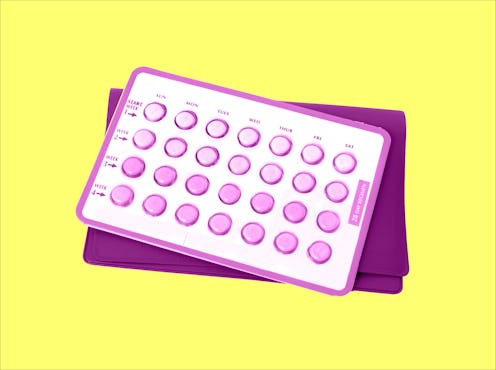Life
Surprising Things That Mess With Your BC

We've all heard those stories about women who got pregnant while on the pill. It can be hard not to wonder if such a thing could happen to us, and more importantly, how exactly did it happen to them? Although these stories are far and few between, even if you take your birth control everyday, there are a number of surprising things that can make your birth control pill less effective. Turns out, there's more to taking the pill then just following a daily routine.
If taken properly, birth control pills are 99.9 percent effective (relieving, right?). But taking them effectively includes timing them right, storing them properly, and making sure your body is clear of other drugs or chemicals that could interact with your hormones and throw your body off whack. With so many things that can have a slight effect, from common medication to everyday foods, it can be hard to tell if we really our taking that pill effectively. If we aren't, it can be equally difficult to pinpoint where we're going wrong.
Luckily, not all factors that affect birth control pills render it totally ineffective, but it's good to know what has an influence on the contraceptive. If you are on the pill and want to assure its efficacy, you should be aware of these seven things that can mess with your birth control.
1. Antibiotics
"Many antibiotics can make birth control pills less effective," Dr. Shilpi Agarwal, MD tells me over email. Certain antibiotics decrease the levels of estrogen in the body, while others can kill the bacteria that convert inactive chemicals to active estrogen. "You should always use a barrier method (condoms) while using an antibiotic and for five to seven days afterwards, depending on the medication," says Argarwal.
2. Throwing Up
"If you are suffering from a stomach virus or have been vomiting or had a bad bout of diarrhea, birth control absorption can be affected," says Agarwal. If you throw up within a few hours of taking your pill, treat it as a missed pill and follow the directions on your pack, and be sure to use backup contraception.
3. Storage Temperature Changes
"Storing birth control pills in a bag that can overheat in the car or in your bathroom can make the medications inactive," says Agarwal. "Store your birth control pills in a cool place, ideally under 75 degrees. If your bathroom gets hot, storing in the bathroom cabinet is also a bad idea."
4. Bad Timing
"Timing matters," says Agarwal. "Aim to take your pill around the same time daily because this helps the hormones to have the most consistent effect on your body and cycle." Taking the pill within a few hours of the same time each day will best protect you. Setting an alarm on your phone will help regulate yourself.
5. Grapefruit
Grapefruits can affect how your body metabolizes the active ingredient in birth control, as the fruit can decrease enzyme levels in the intestine required for breakdown. It can also block the breakdown of estrogen in the body, so try to avoid having more than one grapefruit or two glasses of grapefruit juice at a time.
6. Certain Medications
Certain medications, like antidepressants such as Zoloft and Prozac, along with natural supplements can affect hormone levels in the body, which can reduce the effectiveness of the contraceptive. Most common medications should be okay, but check with your doctor to ensure protection.
Not all of these factors will necessarily ruin your chances of being protected, but make sure you take extra precautions if there is any variance in how you take your birth control pills.
Images: Caroline Wurtzel/Bustle; Pixabay (8)